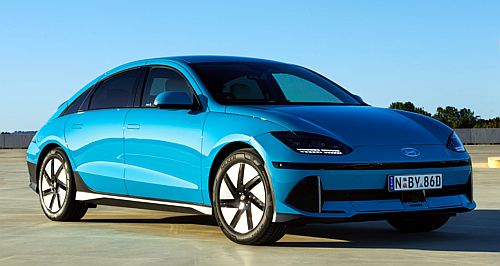News - Market Insight - Market Insight 2023Market Insight: EV cars versus SUVsKEEPING PACE: EV makers keep car design alive as sales match SUV counterparts. Electric vehicles challenge the death of sedan, as EV cars prove as popular as SUVs1 May 2023 By NEIL DOWLING DO NOT believe that SUVs will eventually lead to the disappearance of the traditional sedan, as electrification and clever new products – including the Hyundai Ioniq 6 (pictured) – are holding back the trend.
Outwardly, the growth of EV is seen as simply that – an expansion of new technology in vehicles. But look closer, and aside from breaking into new mobility territory, the electric vehicle movement is also challenging the status quo of what people buy.
Since 2017, SUVs have overtaken the traditional passenger car – that is broadly, sedans, coupes, hatchbacks and wagons – numbers as buyers slip into something that will take them everywhere they dream of going, without actually going there.
It stands that as EVs become more popular, the growth will be in the SUV sector. But it is not.
Electrification has given passenger cars a new lease on life and in the past year, electric cars are breaking trends by proportionately outselling electric SUVs.
In 2012, passenger cars represented 1.8 times the sales of SUVs. In 2023, that ratio had swung around to 3.5 times the number of SUVs sales made compared with passenger cars.
Now, if you look solely at the electric cars – dominated by the Tesla Model 3 and also including the Nissan Leaf, Porsche Taycan and others – the ratio discards tradition and closes right up.
Compared with electric SUVs, electric cars in 2023 year-to-date March data were almost par, with 8477 cars sold compared with 8894 SUVs.
Much of that near-par result is due to the overwhelming sales of the Tesla 3. It commands 65.6 per cent of the medium-size $60,000-plus segment and 54 per cent of the whole medium-car category.
That does not diminish the surprising push-back against the SUV trend that was (and still is) being witnessed by the fossil-fuel sector.
New products are one reason but there is also a wave of style-conscious buying making its way to the showroom.
In 2012, the main EV contenders were the Mitsubishi i-MiEV (it sold 95 in that year); Holden Volt (80 sales); Nissan Leaf (77 sales); and Toyota Prius (1779 sales).
In 2023, the available car-category electric vehicles include the Cupra Born, BMW i4, Hyundai Ioniq 6, Nissan Leaf, Tesla Model 3, Polestar 2, Mercedes-Benz EQE and Porsche Taycan which all add to the appeal of buying an EV.
There were no electric SUVs in 2012, but by 2023 the list ran to include close to 15 models, from the MG ZS to the BYD Atto3, Kia EV6 and Hyundai Ioniq5, Mazda MX-30 and Tesla Model Y, Genesis GV60 and Jaguar i-Pace, Volvo XC40 and Mercdes-Benz EQA and EQB.
Emphasising the growth pattern of EVs by comparing the similarity of the car and SUV EVs is the position of the fossil-fuelled counterparts.
In 2012, petrol and diesel cars outsold similarly fuelled SUVs by 1.8 times. In 2023 YTD figures, the petrol/diesel SUVs outsell cars by a factor of 3.5 – 125,829 SUVs using fuel compared with 37,569 cars (three months of 2023 ending March 31).
And that is the trend line that has been growing since SUVs first overtook the passenger cars in 2017. How long will it take for electric SUVs to convincingly overtake cars? If ever? We’ll have to wait and see.  |
Click to shareMarket Insight articlesResearch Market Insight Motor industry news |
















Facebook Twitter Instagram